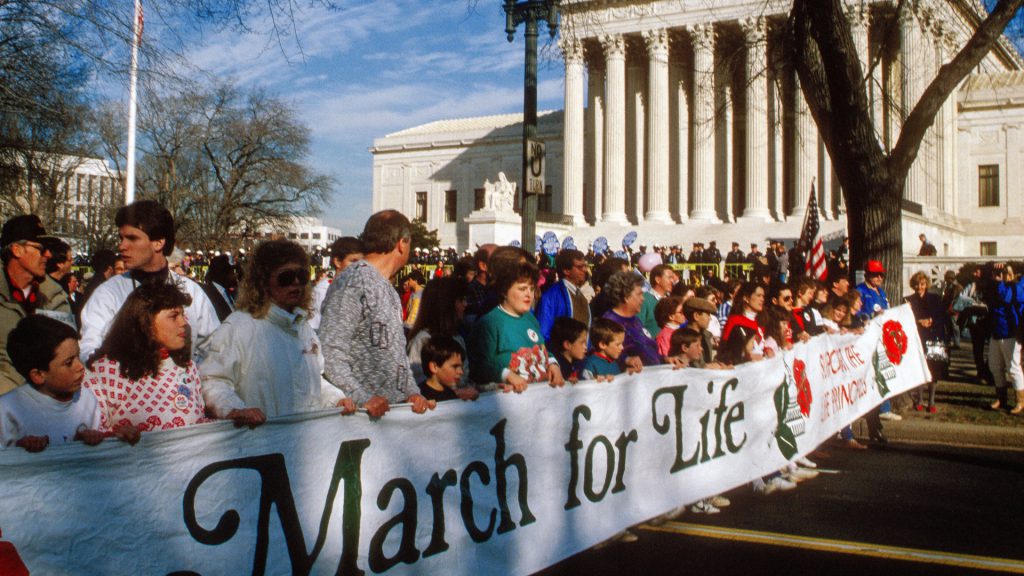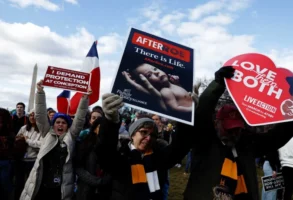
Published January 19, 2022
On January 21, hundreds of thousands of Americans will join the annual March for Life in Washington, D.C., urging the Supreme Court to overturn Roe v. Wade and end abortion on demand. If past years are any indication, most media will ignore the massive gathering or maybe even dismiss it as a religious event.
But make no mistake: The pro-life movement is profoundly American. In fact, it aims to uphold the promise at the core of the American Founding: that every human being, including the unborn child, has inherent dignity and the inalienable right to life.
The fight for life is the most recent effort to ensure that our country abides by the solemn words of the Declaration of Independence. Just as the abolitionists, suffragettes, and civil-rights activists sought to extend that document’s pledge of “life, liberty, and the pursuit of happiness” to those who faced horrible injustices throughout American history, pro-lifers are striving to protect the fundamental rights of unborn children who are killed by abortion. The times have changed, but our founding principles remain the same, as does the need to apply those principles to advance justice.
Some may bristle at the claim that protecting the unborn is a matter of upholding the Declaration of Independence. The abortion debate is so polarized and partisan that it can be easy to take offense at the idea that this is a basic matter of right and wrong. Yet the same was true of injustices that once dominated our country and divided public opinion.
Less than 200 years ago, the U.S. was filled with those who that said slavery was appropriate, and even some, such as John Calhoun, who believed that slavery was a positive good. Just over 100 years ago, huge numbers of people believed that women should not be allowed to vote. Hardly a half-century ago, millions defended segregation and other terrible policies that stripped African Americans of their civil rights. In each of those debates, one side embraced the principles of the Declaration of Independence, and fortunately for our country, in each case, that side eventually won.
The pro-life movement deserves to win, too. While some claim the unborn child is somehow less human than those who are already born, the steady advance of science has decisively proved that these tiny creatures are as human as each of us. When the Supreme Court handed down Roe v. Wade in 1973, we knew much less about the child in the womb. Nearly 50 years later, we can hear their heartbeats and see their faces before they are born, while discovering their unique and irreplaceable DNA. We can save their lives when they’re born prematurely, even as early as 21 weeks into pregnancy. Every year, it gets easier to welcome the unborn into the world and harder to deny their humanity.
The unborn are people, which means that they deserve the same rights as all of us — the rights enshrined in the Declaration of Independence. Its promise of “life, liberty, and the pursuit of happiness” is not a rhetorical flourish; it is a standard that America set forth for itself and must meet. That standard cannot be met so long as abortion exists. Since the Supreme Court forced Roe on an unwilling and unsuspecting country, a staggering 62 million unborn children have been denied the right to life. As far as injustices go, abortion ranks among the most destructive in American history.
The time has come for that injustice to end. The Supreme Court appears prepared to roll back Roe in Dobbs v. Jackson Women’s Health Organization, set to be decided by this summer. No doubt, a decision to reverse Roe will upset many and spark a backlash. But the same was true when Abraham Lincoln and Congress ended slavery, when women secured the right to vote, and when the Civil Rights Act was signed into law.
Each of those achievements involved the expansion of justice through the faithful application of the Declaration of Independence. When future generations look back on the overturning of Roe, they will see the same thing. And they will know that America is freer, fairer, and better for it.
Tim Busch is founder of the Busch Firm, a law firm, and founder of the Napa Institute, a Catholic lay organization. Alexandra DeSanctis is a staff writer at National Review and a visiting fellow at the Ethics and Public Policy Center.
EPPC Fellow Alexandra DeSanctis writes on culture and family issues, with a particular focus on abortion policy and pro-life advocacy, as a member of the Life and Family Initiative.





